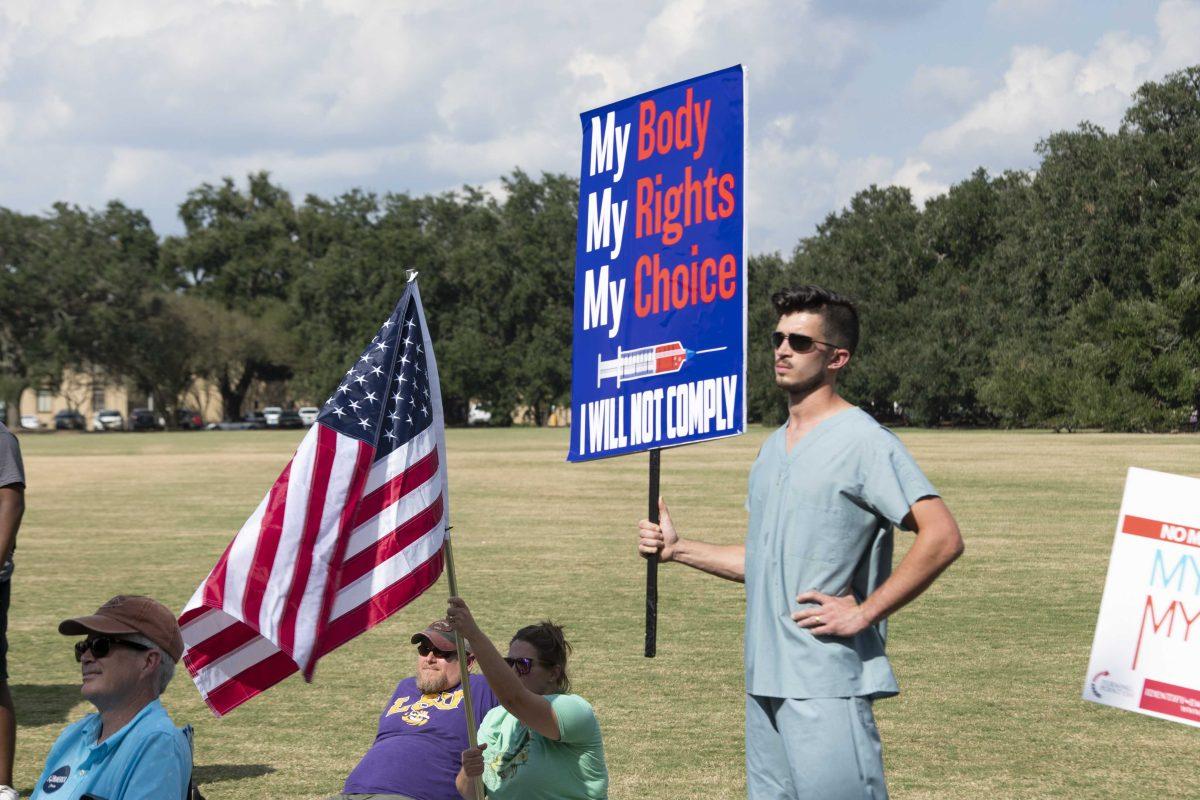Louisiana is one of the least vaccinated states in the nation, with just 52% of eligible residents fully vaccinated, according to the New York Times.
It’s hard to pinpoint exactly what is causing Louisiana’s lagging vaccination rates, as that could change at a regional and individual level. But Louisiana health experts point to misinformation as a main contributor to vaccine hesitancy in the state.
Misinformation
Aly Neel, director of communication for the Louisiana Department of Health, said that while it’s obvious misinformation affects Louisiana’s vaccination rate, the extent to which it does so is hard to quantify.
“We’ve seen the impact of misinformation, the spread of misinformation, during this crisis,” Neel said. “We know it’s dangerous. We know that it’s confusing. We know that it can mislead and we can see the impact on our efforts.”
Dr. Joe Kanter, the Louisiana state health officer, said that there are two types of misinformation: Unintentional misinformation, shared mostly between friends and family members, and intentional misinformation meant to mislead, something called disinformation.
“They have staying power because they hit on people’s fears,” Kanter said. “And people spread them, not intending to misinform anyone.”
Commonly spread myths are easy to take hold when they come from somebody an individual trusts. Fortunately, Kanter said that this type of misinformation is easier to combat.
“That requires a diligent and concerted response from us in the public health community,” Kanter said. “To continuously come back with facts and to point people away from social media ‘experts,’ towards reputable sources.”
The other type of misinformation is harder to stop, Kanter said. Intentional misinformation, spread by well-organized bad actors who spread falsehoods for personal gain.
“Their tired and already heated arguments can be convincing on the surface, because they cherry pick a data point from here or there,” Kanter said. “And if you don’t know their history, if you don’t know that they’ve made the same tired arguments for many vaccines in the past, it can be a convincing pitch, just like a used car salesman.”
Kanter said that the Louisiana Department of Health is trying to figure out a good way to combat that.
That’s where Neel comes in. A large portion of her job these days is combatting misinformation.
Neel said the best way to combat misinformation is “prebunking,” which experts say is more effective than debunking. Prebunking involves predicting what the misinformation will be and getting out ahead of that.
In practice, that means that in the months ahead of an anticipated announcement, like a new age group becoming approved to receive the vaccine, the Health Department is actively campaigning to inform the public about what that means.
Konstantin Kousoulas, a professor of virology and director of the division of biotechnology and molecular medicine at the university, suggested that part of the problem is a lack of communication between experts and the public.
“We have a responsibility of really educating the naive citizen, the person that may not know, and explain them in their own language,” Kousoulas said. “I think what’s happening is polarization. People that know are sitting on the pedestal, people that don’t know, they feel frustrated, so they make their own assumptions.”
Neel said that there is some reason to believe that things are improving.
“We have people who last month, this month, today, are going in getting their first shots or second shots, their booster shots,” Neel said. “Especially someone who’s getting their first shot right now, to me like that is the sign of somebody changing their mind.”
Poverty
Louisiana is one of the least vaccinated states in the nation. It’s also one of the poorest. According to the 2019 American Community Survey, which is done by the U.S. Census Bureau, Louisiana is the second most impoverished state in the U.S., with 19.2% of the population living below the poverty line.
According to Jackson Voss, an economic opportunity policy analyst for the Louisiana Budget Project, that can impact vaccination rates.
“There’s a lot of data that kind of implies that this group of people who aren’t getting vaccinated are more likely to be uninsured and more likely to work in lower income jobs, which are, in turn, more likely to not offer paid sick leave,” Voss said.
Despite the COVID-19 vaccine being free, uninsured people are less likely to be vaccinated, Voss said. According to the 2019 Louisiana Health Insurance Survey, done by the LDH, 11.1% of adults do not have health insurance.
Voss said its hard to pinpoint exactly what economic reasons are preventing this group from being vaccinated, but speculated it may be several intertwining factors.
“There might be concerns from this group of people who are not sure they can get the vaccine for free,” Voss said, “or they’re afraid if they do get it and they get sick from taking the vaccine, or experienced side effects, and they can’t go to work, so they’re going to lose their job or they’re not going to make enough money to make ends meet.”
Voss said that there is some opportunity to help these individuals. The state is currently flushed with cash, with a significant budget surplus and federal funds for pandemic relief. He said the state could use some of that money to set up a paid sick leave program or to fund temporary health clinics.
“I think that when we talk about what’s the connection here, in some ways, it is directly related to the poverty that people are experiencing, but it’s also related to the history of our governments not doing enough to help people,” Voss said.
Louisiana health experts discuss reasons behind Louisiana’s low vaccination rate
February 25, 2022
A Turning Point supporter holds a sign in protest of vaccine mandates Friday, Oct. 22, 2021 during the LSU chapter Turning Point Freedom Rally on the Parade Ground at LSU’s campus.





